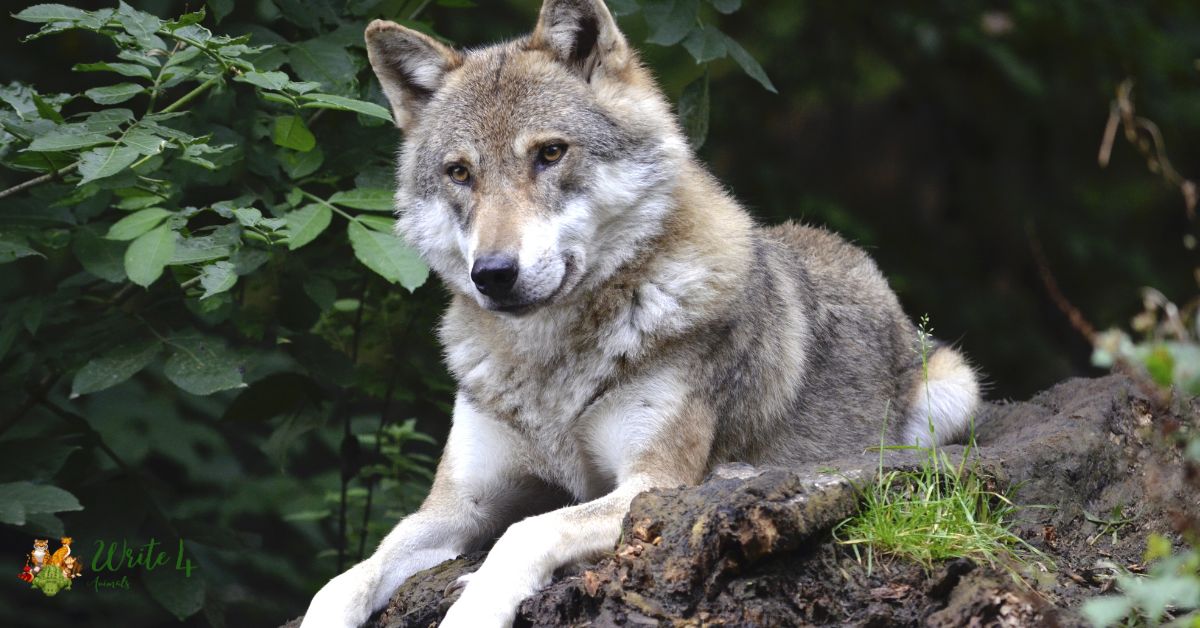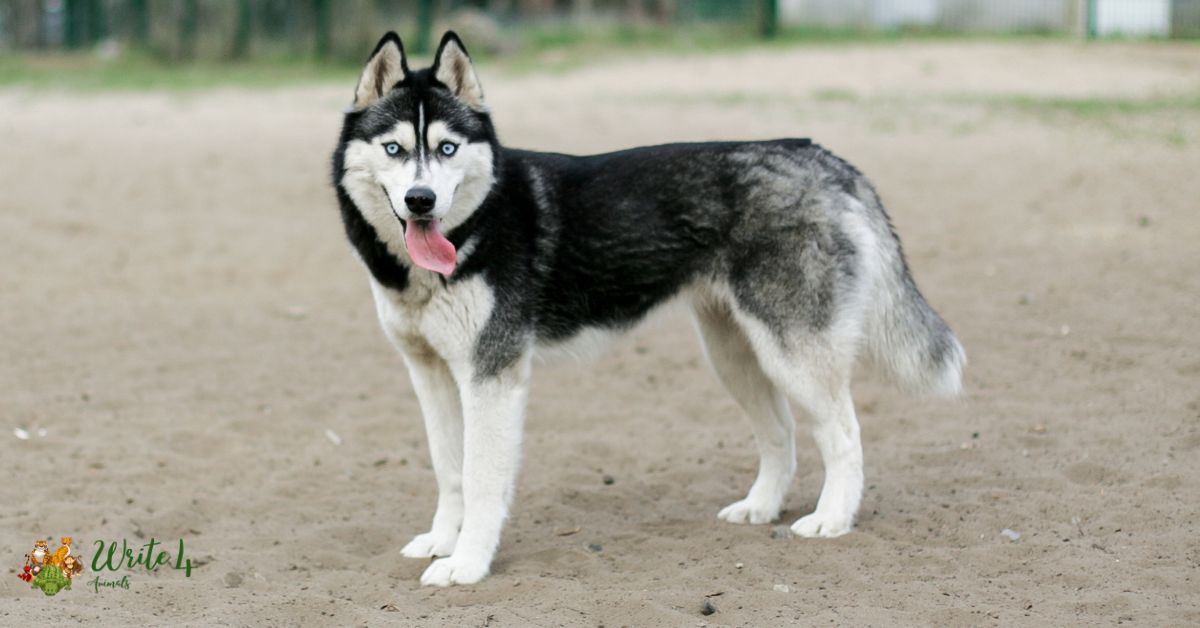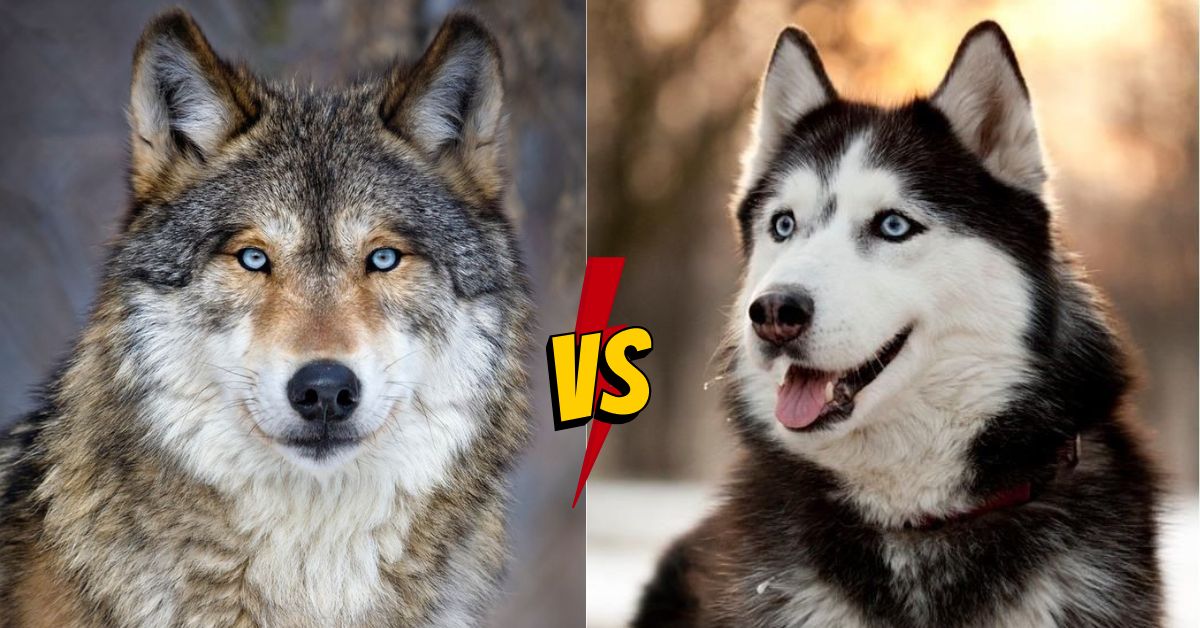When it comes to discussing canines, two majestic breeds often capture the imagination of dog lovers and enthusiasts alike – the wolf and husky. While both these animals belong to the Canidae family, their striking appearances and unique traits set them apart.
In this blog post, we will delve into the intriguing world of the wolf and husky, exploring their similarities, differences, and the factors that make each breed truly remarkable.
Wolf vs Husky Comparison
| Characteristic | Wolf | Husky |
|---|---|---|
| Size and Appearance | Large and robust | Medium-sized and compact |
| Temperament | Independent and cautious | Friendly and outgoing |
| Trainability | Less trainable | Intelligent and trainable |
| Adaptability | Highly adapted to diverse habitats | Adaptable to various living situations |
| Exercise | Require extensive exercise | Need regular physical activity |
| Nutrition | Meat-based diet | Well-balanced diet with protein |
Husky vs Wolf: History and Origins
History and origins play a significant role in understanding the divergence between wolves and huskies. Wolves, belonging to the Canidae family, have a storied past that dates back thousands of years.
They have inhabited diverse regions across the globe, including North America, Europe, Asia, and even parts of Africa. Wolves played a crucial role in ancient cultures and mythologies, being both revered and feared by humans.
In contrast, huskies have a more recent lineage. They originated in northeastern Asia, specifically in the remote regions of Siberia, where the Chukchi people selectively bred them for their endurance and ability to work in extreme Arctic conditions.
The Chukchi relied on huskies for transportation, using them as sled dogs to traverse vast snowy landscapes. These hardy dogs were crucial for survival in harsh environments.
Wolf vs Husky: Appearance and Characteristics
When it comes to appearance, there are noticeable differences between wolves compared to huskies, although they share some similarities. Wolves are larger and more robust than huskies.

They have strong, muscular bodies, standing tall with a majestic presence. Adult male wolves can weigh between 70 to 150 pounds, while females are slightly smaller.
Wolves have a variety of coat colors, including gray, brown, black, and white, with thick, dense fur to withstand harsh weather conditions.
Huskies, on the other hand, are medium-sized dogs. They have a more compact build, weighing between 35 to 60 pounds. Huskies are known for their striking appearance, with beautiful almond-shaped eyes, often blue or multicolored.
Their thick double coats provide insulation, with a soft undercoat and a longer, protective outer coat. Huskies exhibit a wide range of coat colors and patterns, including black, gray, red, sable, and combinations of these.
Wolf vs Husky: Temperament
Temperament plays a crucial role in distinguishing between wolf compared to husky. Wolves are wild animals with complex social structures. They are highly intelligent and possess keen instincts for survival.
Wolves are known for their loyalty to their pack, displaying cooperative behaviors, and communicating through howling and body language. In the wild, wolves are cautious and wary of humans, typically avoiding direct contact.
Huskies, on the other hand, have been selectively bred for centuries to be companions and working dogs. They exhibit friendly and outgoing temperaments, making them excellent family pets. Huskies are known for their affectionate nature, often forming strong bonds with their human family members.

They thrive on companionship and enjoy the company of both humans and other dogs. However, huskies can also display independent and stubborn traits, requiring consistent training and socialization.
Wolf vs Husky: Health
When it comes to health, both wolves and huskies have their own considerations. Wolves, as wild animals, face various challenges and threats in their natural habitats, including diseases, predation, and habitat loss due to human activities. Efforts are made to conserve and protect wolf populations worldwide, ensuring their genetic diversity and overall well-being.
Huskies, as domesticated dogs, can be prone to certain health issues. Common health concerns for huskies include hip dysplasia, eye conditions such as cataracts and progressive retinal atrophy, and certain genetic disorders like inherited polyneuropathy. Responsible breeders strive to minimize these health risks by conducting health screenings, genetic testing, and responsible breeding practices.
Regular veterinary care, a balanced diet, exercise, and a stimulating environment are essential for both wolves and huskies to maintain good health and well-being.
Husky vs Wolf: Trainability
Trainability is an essential factor to consider when comparing wolves and huskies. Wolves, as wild animals, have not been bred for obedience or domestication, making them less trainable compared to domesticated dogs.
Wolves retain their natural instincts and behaviors, which can make training them challenging and potentially dangerous for inexperienced handlers. Their independent nature and strong predatory drive can make them difficult to control and manage in a domestic setting.
In contrast, huskies are known for their intelligence and trainability. They are quick learners and respond well to positive reinforcement-based training methods. Huskies thrive on mental stimulation and enjoy tasks that challenge them mentally.
However, they can also display stubborn tendencies and may require consistent and patient training techniques. Early socialization and obedience training are crucial for huskies to develop good behavior and become well-rounded companions.
Wolf vs Husky: Adaptability
Adaptability refers to an animal’s ability to adjust to different environments and lifestyles. Wolves are highly adapted to their natural habitats and have evolved over thousands of years to survive in diverse ecosystems. They have developed specialized physical and behavioral traits to thrive in various climates, including extreme cold, hot, and arid regions. Wolves have excellent endurance and can cover vast distances in search of prey.
Huskies, too, demonstrate remarkable adaptability. Originally bred to withstand the harsh Arctic conditions, huskies have a thick double coat that provides insulation from cold temperatures. They have adapted to pull sleds through snow and endure long distances without tiring easily. Huskies can also adapt to different living situations, including urban environments, as long as their exercise and mental stimulation needs are met. However, they are not well-suited to hot climates due to their heavy coat.
Wolf vs Husky: Exercise
Exercise is vital for the physical and mental well-being of both wolves and huskies. Wolves are highly active animals that require extensive exercise to fulfill their natural instincts and maintain optimal health.
In the wild, wolves spend a significant amount of time hunting, exploring their territories, and engaging in social interactions within their packs. Captive wolves need access to large, secure enclosures that mimic their natural habitat and provide opportunities for physical activity.
Huskies are also energetic and require regular exercise to prevent behavioral issues that may arise from pent-up energy. They are active dogs that excel in activities such as running, hiking, and pulling sleds. Huskies have a high endurance level and thrive in environments that offer ample opportunities for physical stimulation. A lack of exercise can lead to restlessness, destructive behavior, and obesity in huskies.
Wolf vs Husky: Nutrition
Proper nutrition is essential for the overall health and well-being of wolves and huskies. Wolves are carnivores, and their diet primarily consists of meat. In the wild, they hunt and consume a variety of prey animals, providing them with essential nutrients, vitamins, and minerals.
In captivity, captive wolves are typically fed a carefully balanced diet that includes high-quality meat-based protein sources.
Huskies, as domesticated dogs, have different dietary needs. A well-balanced diet for huskies includes a combination of high-quality protein, fats, carbohydrates, and essential nutrients.
Commercially available dog food that is specifically formulated for active breeds is a suitable choice for huskies. It is important to provide them with the appropriate portion sizes and avoid overfeeding to prevent weight gain.
Frequently Asked Questions
[sc_fs_multi_faq headline-0=”h4″ question-0=”Can wolves be kept as pets?” answer-0=”Wolves are wild animals and are not suitable as pets due to their natural instincts, behavior, and specific care requirements.” image-0=”” headline-1=”h4″ question-1=”Are huskies good with children?” answer-1=”Huskies can be good with children when properly trained, socialized, and supervised. However, interactions should always be monitored to ensure the safety of both the dog and the child.” image-1=”” headline-2=”h4″ question-2=”Do wolves and huskies get along?” answer-2=”Wolves and huskies may not get along well due to their different social structures and behaviors. Introducing them can be risky and should be avoided to prevent conflicts.” image-2=”” headline-3=”h4″ question-3=”How much exercise do huskies need?” answer-3=”Huskies are energetic dogs that require a significant amount of exercise. They need at least 1-2 hours of physical activity daily to keep them mentally and physically stimulated.” image-3=”” headline-4=”h4″ question-4=”Are wolves endangered?” answer-4=”Certain wolf species, such as the gray wolf, have faced threats and were endangered in some regions. However, conservation efforts have led to successful recovery programs, and their populations have stabilized in many areas.” image-4=”” headline-5=”h4″ question-5=”What is the lifespan of a husky?” answer-5=”The average lifespan of a husky is typically between 12 to 14 years. However, with proper care, some huskies have been known to live into their late teens.” image-5=”” headline-6=”h4″ question-6=”Can huskies live in warm climates?” answer-6=”Huskies have a thick double coat designed for cold weather and are not well-suited for warm climates. They may struggle with heat and require extra precautions, such as providing shade and access to cool water. ” image-6=”” headline-7=”h4″ question-7=”What is the main difference between a wolf and a husky?” answer-7=”The main difference lies in their domestication status, size, temperament, and specific physical characteristics. Wolves are wild animals, while huskies are domesticated dogs selectively bred for specific purposes.” image-7=”” count=”8″ html=”true” css_class=””]
Recommended
2. Cane Corso Pitbull Mix 2023
